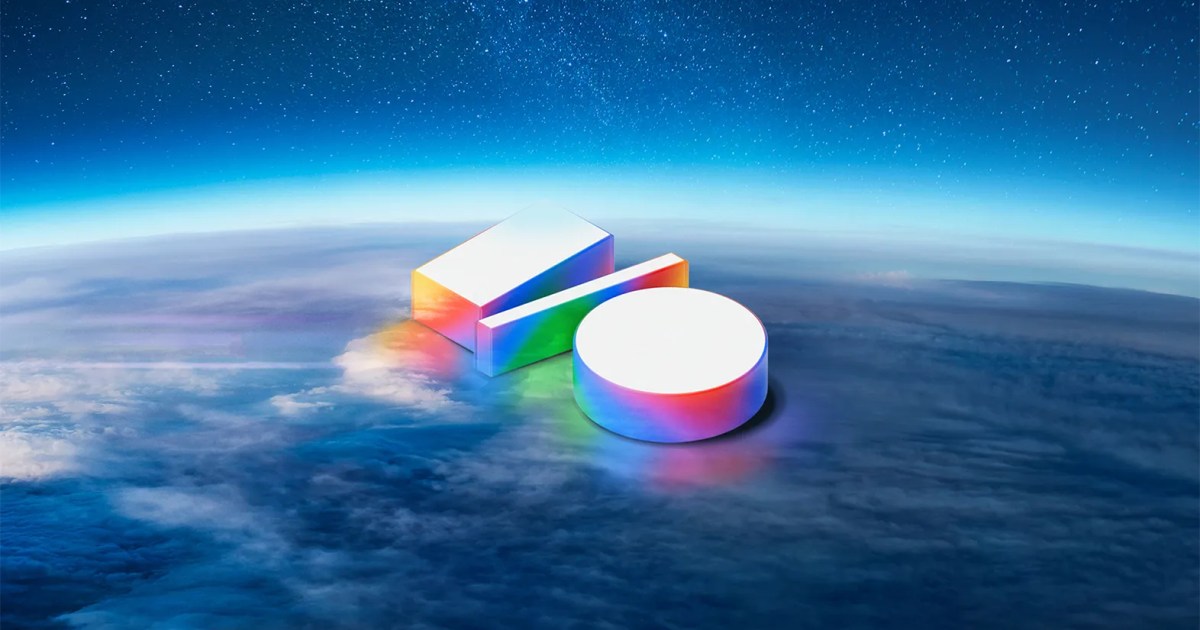Google IO 2025 delivered us a huge helping of AI during the almost two-hour opening keynote.
Google’s CEO, Sundar Pichai, and colleagues got through an awful lot on stage, and while some of the talk was aimed primarily at developers, there were plenty of big announcements for us – the people on the street – to explore.
1. Google Beam: AI-enabled 3D video calls
If you’re someone who finds themselves spending a lot of time on video calls for work, Google Beam will be of interest. Beam is an “AI-first video communications platform”, giving you glasses-free 3D visuals.
With a Beam device, AI will take your video feed and convert you into a realistic 3D video model. The result is an effect that you’re are sitting across the table from the person on the other end of the call, with Google claiming “near perfect head tracking, down to the millimeter, and at 60 frames per second.”
You’ll need dedicated hardware to take advantage of its ability to convert 2D video into 3D models (like the six camera equipped screen from HP in the image above), so Beam isn’t something you’ll be using at home – at least for now.
All the demo videos we’ve seen only show 1:1 conversations, with no mention on whether it can handle multiple people round a desk. The first Google Beam devices will be available later this year, so prepare yourself for a 3D meeting makeover.
Google’s also exploring real-time speech translation for Beam, allowing users to have a flowing, natural conversation even if they speak different languages.
2. Google AI Ultra: the VIP AI subscription
Google has re-worked its AI subscription plans, with two paid tiers now available to consumers.
Google AI Pro
Google AI Pro is the new name for the AI Premium plan, and costs $19.99 per month.
It includes;
- Gemini app – Gemini 2.5 Pro, Deep Research, Veo 2
- Flow – access to the AI filmmaking tool with Veo 2
- Whisk – higher limits for image-to-video creation
- NotebookLM
- Gemini in Gmail, Docs, Vids & more
- Gemini in Chrome (early access)
- 2TB of storage for Photos, Drive & Gmail
Google AI Ultra
If you really love Google’s AI suite though and want to have access to the latest and greatest models, you’ll need the Google AI Ultra plan. It’s far from cheap though, at a staggering $249.99 per month.
You get everything included in AI Pro, along with;
- Gemini app – highest limits, exclusive access to 2.5 Pro Deep Think and Veo 3
- Flow – access to the AI filmmaking tool with Veo 3
- Whisk – highest limits for image-to-video creation
- NotebookLM – highest limits and best model capabilities
- Gemini in Gmail, Docs, Vids & more – highest limits
- Project Mariner (early access) – AI agent research prototype
- YouTube Premium individual plan
- 30TB of storage for Photos, Drive & Gmail
Google has kept the free tier as well, for more basic access to Gemini without a monthly bill.
3. Google Search: an AI makeover and a fun shopping feature
Google Search is getting a host of new AI features, with the overarching addition being ‘AI Mode’ allowing you to ask more complex queries as well as follow-up questions.
Google claims AI Mode can handle any question, and it’s keen for you to search whatever’s on your mind. AI Mode goes much deeper than traditional Search when it looks for a response, and it apparently checks its responses too, so hopefully no more AI hallucinations.
The idea is for Search to offer you a more complete experience, without the need to visit multiple websites. It wants to help you buy tickets for events and make restaurant reservations (via Project Mariner AI agent), help with school projects (with Project Astra integration), and even show you what you’d look like in that jacket you’ve been eyeing up. Yes, really.
‘Try On’ is a feature which will arrive in the coming months, allowing you to upload a full length picture of yourself when you tap the ‘Try On’ button which appears over images of clothing in Google Shopping results.
Complex analysis and data visualisation is coming to AI Mode later this summer for sports and finance questions, with the ability to display findings in AI-generated graphs, charts and more – not just text. Plus, Personal Context Mode will arrive in AI Mode this summer – where Search will also be able to scan your inbox to provide more personalized responses.
4. Google Flow: AI-powered filmmaking
Google announced new versions of its AI image generator (Imagen) and AI video generator (Veo) during the IO 2025 keynote, and both of these systems are used in its new AI filmmaking tool, Google Flow.
Imagen 4 improves on the company’s AI text-to-image generation, with enhanced picture quality and enhanced processing speeds. The big advancement here though is its ability to properly handle characters and text in images. Imagen can now properly format text, and place it in sensible places in your images.
Veo 3 takes Google’s AI video generator out of the silent age and into the audio era. It’s now able to add background sound, sound effects and dialogue to the videos generated from your prompts.
You can use these AI models standalone, but Google Flow brings these tools (along with Gemini) together into a complete package for filmmakers to create cinematic clips. You can even mix your own video clips and imagery with the AI generated content to fine tune your creation.
There are tools to allow you to shorten sections of the video, extend other sections by adding additional prompts, and control the camera direction and angle for the best perspective in each scene.
Google Flow is currently available to Google AI Pro and Google AI Ultra plan subscribers in the US.
5. Android XR: smart glasses are closer to reality
Perhaps the most exciting part of the entire IO 2025 keynote was towards the end where Google focused in on its Android XR platform for VR headsets and AR glasses.
We’ve already heard about its collaboration with Samsung on the Project Moohan VR handset, and Google confirmed on stage that its Apple Vision Pro competitor will be available to buy later this year.
What was more impressive was the live demo of Google’s Gemini-powered AI smart glasses. We saw how Gemini was able to show messages, accurately identify the subject matter in a series of photographs on a wall, remember where the wearer bought their coffee that morning and provide walking directions back to the café, while creating a calendar entry and inviting a friend to meet there later in the day.
Google announced Gentle Monster and Warby Parker will be the first partners to launch glasses with Android XR – with Samsung following on after.
This was a convincing smart glasses display from Google, and it feels like the technology is now within touching distance. We hope Google will share more later this year, as we’re still waiting on a release date for the first set of specs.
Read the full article here












